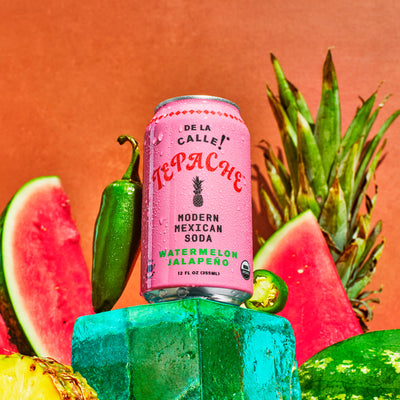What is kombucha good for and how does it compare to tepache

In terms of probiotic drinks, drinking kombucha has been one of the most popular choices on the market in the past few years. However, with the rising popularity of tepache you might be wondering: how do these two fermented drinks compare to one another? Is one healthier? We’ll answer both of those questions and more in this article!
Overview
Before we dive into the health benefits of each drink and how they compare to one another, let’s take a quick look at both kombucha and tepache in general. Both of these beverages are probiotic drinks, which means that they contain live microorganisms (i.e. live bacteria) that have beneficial effects for your health. This also means that they both have a fizzy, bubbly texture and slightly sour flavor.
Both kombucha and tepache are often flavored with fruits and spices, often making for a decent antioxidant amount. Generally speaking, however, tepache has a slightly less strong flavor. Given that both are products of the fermentation process, they each contain small amounts of alcohol. However, in accordance with standards set by the U.S. Alcohol and Tobacco Tax Trade Bureau, they both contain less than 0.5% alcohol when marketed as “non-alcoholic” in the United States.
What is Kombucha?
Kombucha is a fermented tea made with three basic ingredients: yeast, sugar, and black tea. Kombucha starts out as a sugary tea (often green tea) before fermentation. In order to initiate fermentation, a SCOBY (“symbiotic culture of bacteria and yeast”) is used, just as in the process to make other fermented foods such as vinegar.
What is Tepache?
Tepache is also a fermented beverage, but unlike kombucha, it is made from pineapple and water. The base ingredients of this fizzy drink are pineapple and water. It is often flavored with added sugars, spices, and other fruits. Although tepache also relies on fermentation to be made, it does not necessitate a SCOBY. Instead the mixed ingredients are simply set aside and ferment naturally.
By the Numbers
In this section we’ll take a look at kombucha tea and tepache by the numbers to see how these two probiotic beverages compare to one another.
Kombucha
In one 12 ounce bottle of kombucha there are (on average):
- 37.5 calories
- 0 grams of fat
- 10 mg of sodium
- 9 total grams of carbohydrates
- 9 total grams of sugars
- 0 grams of protein
- 5% juice
Tepache
In one 12 ounce can of tepache there are (on average):
- 40 calories
- 10 mg of sodium
- 18 grams of carbohydrates
- 2 grams of dietary fiber
- 8 total grams of sugars
- 7 grams of erythritol
- 0 grams of protein
- 4% juice
Health Benefits
Both tepache and kombucha are very good for you, and can benefit your digestive and immune systems. That being said, they offer slightly different health benefits that are important to note as well.
Similarities
As fermented, probiotic drinks, the biggest benefit that kombucha and tepache can offer is a boost to your gut health by helping out the naturally occurring good bacteria in your gut. When you are struggling with a bacterial infection or are taking bacteria-killing medications such as antibiotics, probiotics such as these two drinks can be crucial in helping to return the bacterial equilibrium in your gut to a healthy symbiotic colony of bacteria.
In addition, both kombucha and tepache can help ease and soothe the symptoms of uncomfortable GI disturbances. They can also be helpful in maintaining weight or weight loss because they help your body excrete rather than store fat, and can keep you feeling fuller for longer.
Differences
Although they have a similar nutritional profile, there are key differences between these two probiotic beverages. Usually, tepache has less sugar because it is made from pineapple and therefore naturally flavored. Given that kombucha is made from tea, more sugar and additives must be added to give it a strong flavor whereas tepache has a citrusy flavor before anything else is added.
Other Notable Differences
Aside from their difference in health benefits, there are a few other notable differences between both the overall characteristics and health benefits of kombucha and tepache that might help you choose between these two.
Acids
It’s important to note the byproducts of the fermentation that occurs when making both kombucha and tepache. There are several acids produced when tepache and kombucha are made. However, kombucha naturally contains more acetic acid than tepache, whose primary acid is lactic acid.
Given this difference, tepache has a slightly more mild, less funky flavor than kombucha, so if you’re looking for a delicious probiotic that’s less sour, tepache is perfect for you!
Cocktail Making
The difference in acids also affects how well each of these probiotic drinks work in cocktails. Given that tepache has a more mild, less sour flavor, it works better in cocktails because it does not dominate the flavor profile of mixed drinks. Although there are cocktails made with kombucha, tepache is a more versatile addition to alcoholic beverages.
Also, the citrusy flavor of the pineapple in tepache allows it to pair especially well with liquors such as tequila. If you’re hoping to make tepache and tequila cocktails, it’s also a great idea to have agave syrup on hand to sweeten the drinks to your liking.
Home Brewing
Another important difference between kombucha and tepache is the ease with which they can be brewed at home to make it even easier to add into a healthy diet! Tepache is significantly easier to brew at home because the only ingredients and supplies that you absolutely need are the peel and core of a pineapple, water, some type of sugar, and a jar large enough to hold all of the ingredients.
In order to make kombucha, on the other hand, you have to make or acquire a SCOBY. Making a SCOBY at home is a time consuming and precise process. It takes roughly 2 to 4 weeks to grow a SCOBY from scratch and requires that you have premade, raw kombucha. It is also a potentially risky process. Given that the job of the SCOBY is to protect the kombucha while it is fermenting, if you have a SCOBY that lets “bad” bacteria into your kombucha, you will then be exposed to this bacteria.
For this reason, if you’re thinking of dipping your toes into the home brewing process, it’s a good idea to start with brewing tepache because it is easier to make, requires less time, and is a less risky endeavor.
Origins
Tepache and kombucha also have very different origin stories. It is thought that kombucha originated in China around the year 220 B.C and was originally used for medicinal purposes. In the early 20th century as more trade routes were developed, kombucha made its way to Europe and Russia. When important research was conducted in the 1960s, kombucha gained popularity in the United States. However, it wasn’t until 1995 when the first wide-scale distribution of kombucha occurred in the U.S.
Tepache, on the other hand, has its origins in pre-Columbian Mexico where the recipe was passed down orally for several generations and escaped the standardization and taxation that other traditional Mexican foods and beverages underwent at the hands of the conquistadores.
Conclusion
Overall, both kombucha and tepache have several health and wellness benefits including providing boosts to your gut microbiome and immune system, and even supplying you with important nutrients like B vitamins and polyphenols. That being said, tepache generally contains less sugar and has a slightly less bold flavor than kombucha because of the acids produced in tepache during fermentation.
Tepache is also considerably easier to make at home and goes well in cocktails, so consider whipping up a batch for your next Taco Tuesday!
Sources:
https://www.healthline.com/nutrition/kombucha-scoby
https://www.health.harvard.edu/staying-healthy/can-gut-bacteria-improve-your-health












